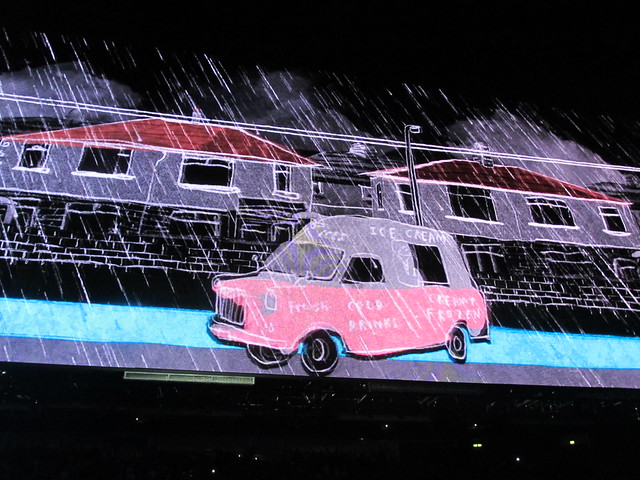
U2 “Experience And Innocence Tour” Berlin Arena 31st August 2018
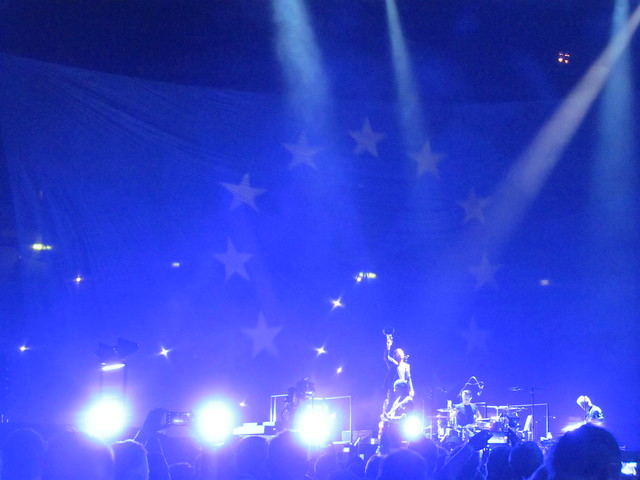
Three years later, U2 work on the concluding part of what has – perhaps unintentionally – become a themed triptych of related touring ; building on 2015’s “Innocence” tour, and last years somewhat nostalgic “The Joshua Tree 30”, the last part – this tour - is a determinedly forward thinking, modern show – part art installation, part rock gig with half of the set being new songs from the past five years. Whereas “Innocence” seemed all about growing up, and finding your place in the world, and “The Joshua Tree 30” tour felt like a look back and a contextualising of the past in the present, of coming to terms with history, “Experience” feels different ; about the here, and the now, and the future. It’s a strong and powerful, clever show. Like everything U2 it’s “political”, but political only in the sense that the bands work has always addressed the state of the world what we do in our place in the world.
It starts in a way that clearly, unambigiously, makes its position clear. Redesigned for Europe, the show places politics front and centre – and the inevitable too much politics crowd can shut up. Politics – or more correctly, ethics – has been part of the U2 texture for forty years : and, at the ground level, in every part of the band. If U2 has been a band, it has also been an exploration ; a way of trying to find out how one fits into this world, and how others are also part of this. The opening montage is a heady mixture of footage and sounds that contextualises the rest of the show ; alongside MRI scan footage and static, it also combines carefully selected shot a of each city the band will be visiting on tour, taken from war damaged history. Berlin 1945, London 1940, Manchester, amongst others, showing the universal, and great leveller that is war. It is a carefully selected warning, as a remix of the bands “Zooropa”/”Love Is All We Have Left” is played, and perhaps most pointedly the Speech To Humanity from Charlie Chaplin’s “The Great Dictator” addresses the crowd.
Certainly, some of it will go over some heads. But context is important : to me, this montage sets the tone of the show – a near death experience represented by the MRI, a crisis point for reality, a moment of surrender and revelation : and in that moment, where we see our whole lives flash before us, and we see things the way we really are, and where we are now is a warning.
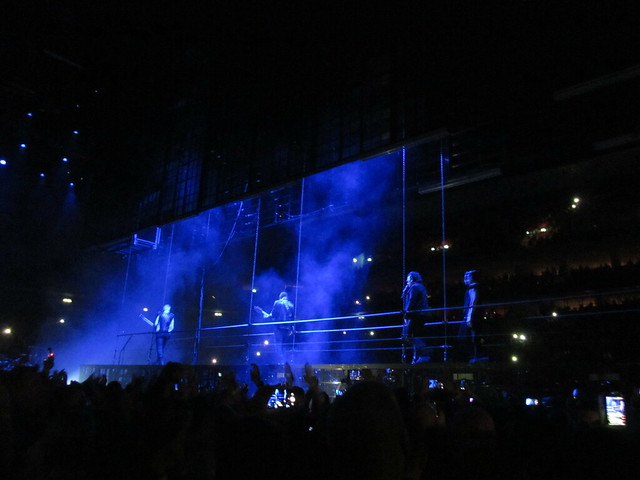
In the context of things, “The Great Dictator” is an obvious but also sly move. Hitler – who walked the streets of this town, and whose shadow hangs heavy over the continent still – was apparently furious about the obvious mockery of him. “The Great Dictator” (and apologies if you are aware), sees a hairdresser become a stand in for the great dictator. The mockery of power is biting and, even now, amongst the most obvious and effective political satire made. The parallels drawn between then and now are also clear – the current political climate sees the world standing on the edge of American dictatorship and every day it isn’t stopped it becomes more likely. It is a terrifying time to live in. The world has become poor in the space of a generation, and we are implored to fight amongst ourselves for scraps of nothingness.
And it helps that U2 are at this age, still pushing to explore new ideas, find new meanings in their songs. Old songs are given new meanings, and new songs are shown to be part of the bands overall work : the positioning of songs next to each other draws lines between them. Does “I Will Follow” now work better because “You’re The Best Thing” also draws on the refrain of walking away, why am I walking away? versus Walk away, walk away. I will follow.
The show opens with last years roaring protest song “The Blackout”. It’s both an urgent, and supple exercise – musically taut and urgent, and lyrically biting. It’s all about extinction, earthquakes, the collapse of civilisation, the end of the world as we know it – and in the heart of it is a line that certainly rings true to me : “Blackout. It’s clear. Who you are will appear.”
It seems such an obvious, reductionist truism, but we show who we are when tested, and this song, at this time, is important to me : I have personally, travelled through a terrible and testing five year run of relentless battles, and survived and came out the other side alive. Who I was did appear, and it was a near extinction level event.
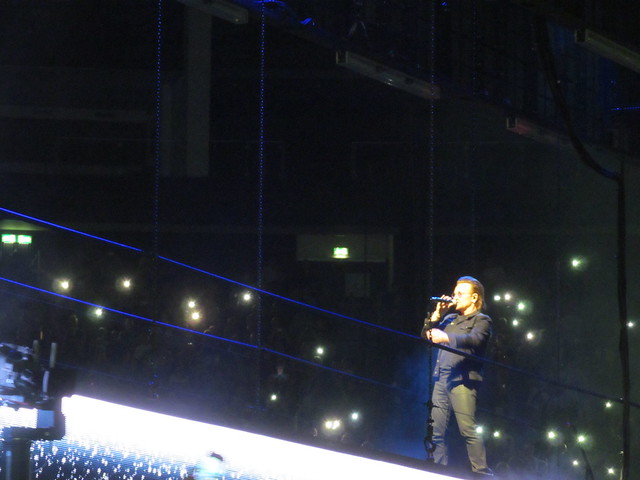
With the battle played out on stage, the next song is an exclamation of survival. Bono sings clearly “I shouldn’t be here. I should be dead.” Certainly, the first few songs in the set directly address mortality ; even later, with “Beautiful Day” which is the first ‘big hit’ of the note, is a celebration after a near-death event. Seize the day, don’t let it get away. It’s followed by “The Ocean” (played in Europe for the first time since 1982), that moves seamlessly into “Iris”.
The middle quarter of the show acts as a virtual reprise of the 2015 tour. The four songs that follow – “Iris”, “Cedarwood Road”, “Sunday Bloody Sunday” and “Until The End Of The World” – are largely the same as they were. In this context, and it is only now, I realise, that “Iris” is so damn important ; a key point of the tour, and the bands work, that openly addresses the premature death of Bono’s mother. It’s raw, but true, and it feels a lot like a lot of our lives : Iris says that I will be “The Death of Her” But it was not me. The second half of the show takes the promise of 2015’s “Innocence” tour and builds upon it. Thematically, it opens with “Elevation” and “Vertigo”. Both are well known, almost tired, numb-through-overexposure songs that have been played at 99% of U2 live shows since their release. (“Vertigo” missed ten shows last year but aside from that made 316 shows in a row and at one point was played twice at 38 shows). Sure, the songs get the crowd jumping and they’re great stupid fun to play, but at the heart of “Elevation” is a lyrical emptiness, a lack of cohesion that has somehow made the song lesser over the years. It’s U2’s worst song lyrically, and ultimately it’s like candyfloss : it tastes good, but full of air and nothingness. It makes you feel full but doesn’t fill you up.
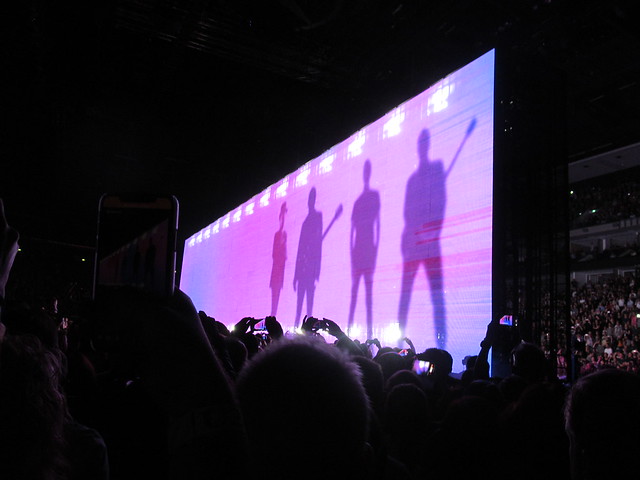
For the European leg, the band bring back “Even Better Than The Real Thing” – having missed every American show thus far. Linked with a thematic speech from alter-ago McPhisto, it addresses the reality gap we often face these days ; the void between what we see and what we are told we are seeing, and the nature of identity. Following that comes the ‘holy grail’ of U2 live performances : “Acrobat” sees its first performance in Europe ever, just 27 years after release. On stage its biting, powerful, pointed, urgent. And it shows that a song that is fresh to the band – no matter how old – is not dulled by time. Lyrically it fits perfectly with the theme of the tour : resistance, reality, delusion, and conflict – and Edge peels out the solo in a way that feels new and old at the same time. It’s glorious. U2 should play more older, rarer songs : because unlike many bands, U2’s “crap-songs-on-the-album” ratio is really very low, and even songs they rarely played at the time are still normally very very good. A look at the hits the band haven’t touched on the tour so far is staggeringly big : it’s also necessary that the band play nothing from “The Joshua Tree” on this tour. They played that record in full last year, and to then play huge chunks of it this year is redundant.
Also, any show without “Bullet The Blue Sky” is a good one in my opinion. I know U2 love this song, but I don’t. It’s hectoring and to be honest, has been very boring on occasion. This tour is clearly aimed at the bands newer material, with 10 songs less than 5 years old in the pack, and the back half of the set is almost all newer material. Unlike most U2 gigs of the past 25 years – which have been a celebratory victory lap of “Bullet The Blue Sky”, “Where The Streets Have No Name”, “I Still Haven’t Found”, “With or Without You” and similar, all those songs are mercifully rested. Sure, you can say that U2 haven’t played Australia in 8 years and be factually correct, but I like my artists to be more than a breathing jukebox, and not every song needs to be played at every show. Songs like “New Years Day” are ones that some bands would make staples of their set : here, U2 have played it at just 4% of their previous three indoor tours.
The acoustic set moves from sincere to passionate and furious in a blink. “You’re The Best Thing About Me” is a gentle, heartfelt love song – and followed with “Summer of Love”. The latter is a powerful song about refugees dying by the hundreds as they flee war. The visuals start to become horrifying familiar, with shots of devastation and despair that are designed purely because they are identical to the opening carnage – the eternal battle, mankind in a loop, trapped in repeating itself with brutality. It’s followed by a necessary “Pride” – recontextualised into a great song about human equality, and the call to arms that is “Get Out of Your Own Way”, “New Years Day” - thrillingly rearranged with huge chunks of the 12” remixes used – becomes a new song after many years of being predictable. It’s the little things that give you away, after all. As the band perform, the European flag hangs behind them, and the band sing of soon, we will be one. Unity is baked into who U2 are : You too indeed.
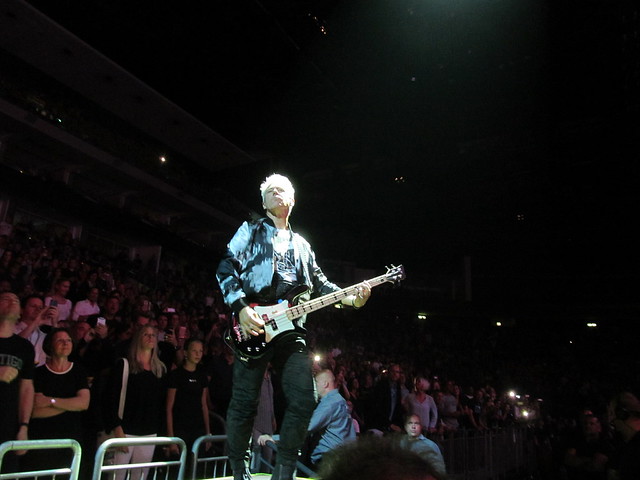
There’s “City Of Blinding Lights”, and “One”, both of which present a unified world. Whilst the show itself is a regimented presentation, lacking both the excitement and spontaneity of the innocence leg of this tour, it is instead a clear, and precise presentation of the modern day band. After three shows where the band address thematically – and with guts – who they are now (and who they were), where they have come from, and how they got here, U2 bring the trilogy to a close with “Love Is Bigger Than Anything In Its Way” and “13”. The former is an obvious attempt at a late period hit epic, with a huge rousing chorus, but also, and perhaps best of all, a clear message of hope and unity written from one generation aging to a younger one : U2 here are becoming, for the first time, aware of the passing of time and passing of the baton, and doing so with a form of dignity that ‘just play the hits’ legacy acts often miss. After all of this, and the context of horror we live in, U2 still are optimists. Love Is Bigger Than Anything In Its Way.
The show closes with “13”. In this, imagery from the previous shows comes to life on the stage, and Bono grasps the tours recurring motif of a lightbulb in person. It’s the correct ending to the show ; as he sings there is a light, don’t let it go out, a light shines in darkness, symbolising both the lightbulb-as-idea, and revisiting the lightbulb symbol from the previous tour ; that somehow the concept, the idea, the band is their own light in the darkness, their own salvation. And I can be ours too. And for some of us here, they are : There is a light. Don’t let it go out.
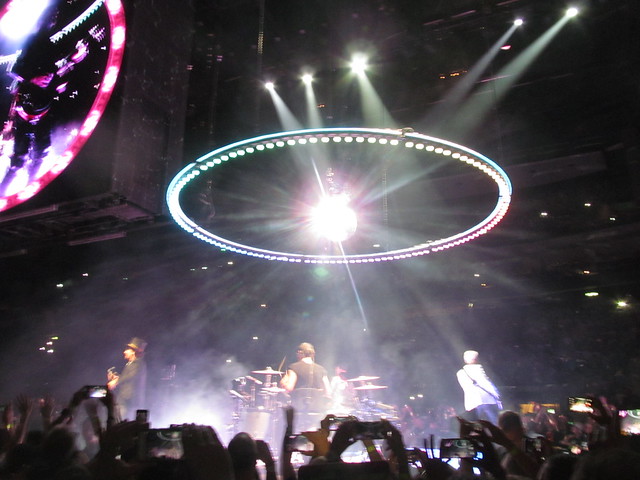
The Blackout
Lights Of Home
I Will Follow
Red Flag Day
Beautiful Day
The Ocean
Iris
Cedarwood Road
Sunday Bloody Sunday
Until The End Of The World
Hold Me Thrill Me Kiss Me Kill Me
Elevation
Vertigo
Even Better Than The Real Thing
Acrobat
The Best Thing
Summer Of Love
Pride
Get Out Of Your Own Way
New Years Day
City of Blinding Lights
One
Love Is Bigger
13
